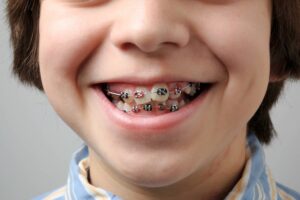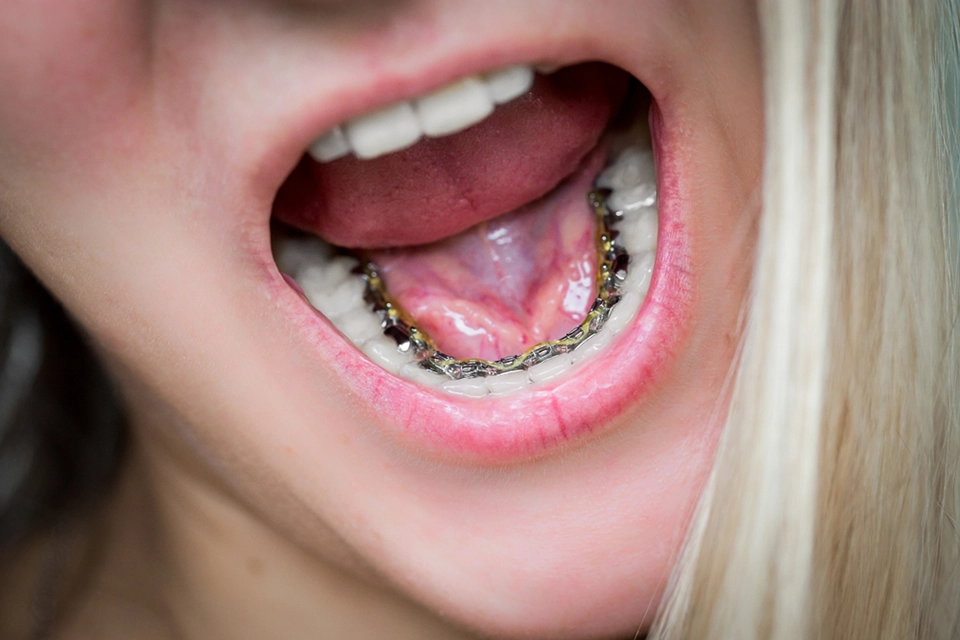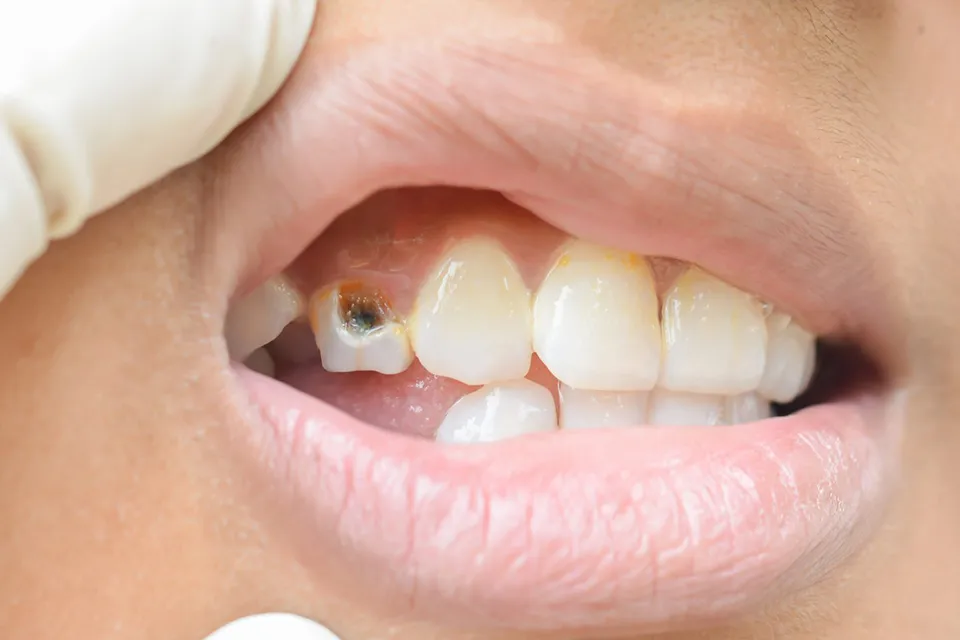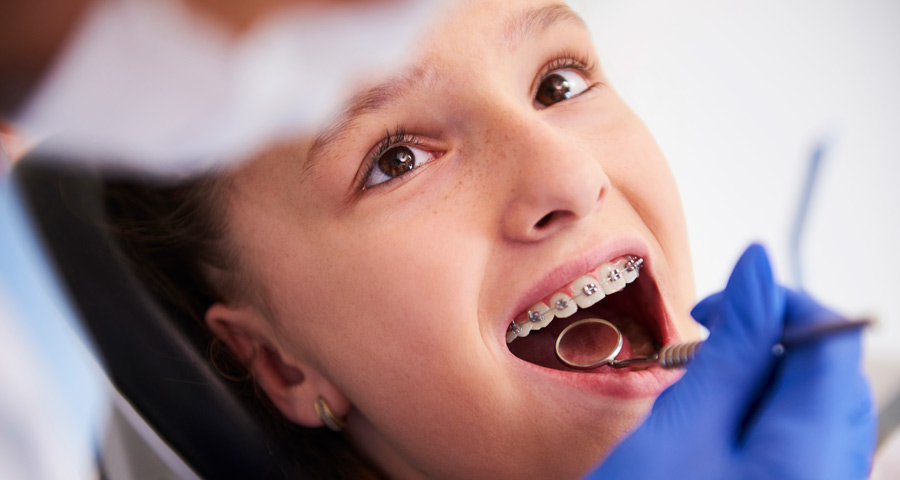Getting braces is a big decision. Whether you have a child who might need them, or you’re considering dental braces for yourself as an adult, you already know there are plenty of factors to weigh. The good news is, there is no “correct” braces age, after which they’ll no longer work. The more complicated news is, there are better and worse times for dental braces.
Let’s take a look at who needs braces, the best ages for getting them, first steps before getting treatment, how long the process takes, the treatment process, and costs and financing. By the time you’re done reading, you’ll have a much better idea of your options for dental braces by age, as well as how to move forward.
Who Needs Dental Braces?
While there are several types of braces, from Invisalign to brackets, they accomplish the same goal. The main idea is that applied force moves teeth into more desirable positions. This can be accomplished by plastic molded to teeth or brackets glued to teeth and guided by wires.
There are many reasons to get dental braces, from the purely cosmetic to the critically health-based. Braces not only lead to a better smile, they help reduce the incidence of:
- Cavities and gingivitis
- Tooth loss
- Reduced effectiveness of chewing and speaking
- Jaw pain and problems
- Enamel wear
Anyone with a misaligned bite (more properly known as malocclusion) or crooked teeth is a good candidate for braces, whether young or old. Your orthodontist – the medical specialist who deals with teeth that need straightening – will let you know whether you or your child is a good candidate.
The Youngest Age for Dental Braces
There is no technical age at which children are too young, but they need some adult teeth in place before starting. Baby teeth and adult teeth don’t necessarily line up, so braces put purely on teeth that are going to fall out is pointless. Once adult teeth come in, however, it can be helpful to begin arranging them to make it easier for other adult teeth to emerge in the right spots.
Note that children can get dental braces on baby teeth, which helps anchor the adult teeth in place. This will not damage the mouth in any way or cause changes in when baby teeth fall out. However, as there is no need for braces before any adult teeth come in, there’s no need to visit the orthodontist before age 6 or so, at the earliest.
An additional note: orthodontics and dentistry are different. Your child should visit the dentist from a much earlier age. According to Stanford Children’s Health, “The first dental visit is recommended by 12 months of age, or within 6 months of the first tooth coming in.”

The Oldest Age for Dental Braces
Good news for the older crowd: there is no cap on age for getting braces. Orthodontists sometimes opt to put them onto adults in their 70s or even 80s. As long as you have most of your teeth, and there is a good medical reason for braces, you can get them at any time.
What Do You Need to Do Before Getting Dental Braces?
Before you get braces, your orthodontist will want to make sure you have a good oral hygiene routine and there are no cavities. You will continue dental visits throughout the braces process, but braces make it much harder for your dentist to work in your mouth, so it’s important that all of your dental work be completed ahead of time. That way, you can go into braces with a clean bill of health.
How Long Does the Process Take for Dental Braces?
Braces usually take between 12 and 24 months, if you count the time that brackets are actually on the teeth. For patients whose braces will occur in stages, the overall time from start to finish could be more like 5 or 6 years. That’s usually only for children who are waiting on adult teeth before the second stage, however.
What Is the Ideal Dental Braces Progression?
Again, there is no age before or after which dental braces won’t work (with the exception of before a child has any adult teeth). But in a perfect world, there is an ideal progression when it comes to braces:
- The first time a child should get braces is before they hit puberty, between the ages of 8 and 14, roughly speaking. That’s because the mouth and jaw go through serious changes in response to hormones, and it is easier to move teeth into position before this process occurs. Orthodontists use dental braces to move teeth around before all of the teeth are even grown in, which can make it easier for adult teeth to come into the right places.
- Optionally, the second time a child should get dental braces is after most of the teeth come in, the age of which depends on the child. Your orthodontist will advise you on whether the child needs to be seen for a second round to give adult teeth a final straighten, which will conclude sometime in the teen years.
- A third round is almost never recommended, but is not as uncommon as you might think. Typically, this happens when a patient fails to wear their retainer afterward, so keep in mind that this is a critical part of the dental braces process. If you don’t think you are reliable enough to wear a retainer or ensure your child does so, ask about permanent retainers – and don’t be ashamed. Tons of people have them!
Does Age Affect Costs and Financing?
Many people wonder how the age of the patient impacts the costs of braces and the financing for it. Let’s look at the latter first: financing is the same at pretty much any age. If you need to pay out of pocket, your orthodontist will almost certainly be able to set you up on a payment plan that spreads your financial burden out over a number of months.
Orthodontic treatment is billed in one of two ways: either in a lump sum for the whole process, or in stages as the treatment progresses. In the former case, your orthodontist can make a payment plan of equal installments for the whole amount. In the latter case, you will pay as you go, so there will be a natural installment process.
Costs vary, of course, depending on the patient’s needs. This doesn’t usually vary by age, although older patients may require longer treatment because their teeth do not move as easily. On the other hand, younger patients are likely to get their treatment in multiple phases, which counterbalances this. In short, your journey (or your child’s) is unique and can’t be predicted until an orthodontist takes a look.
To learn more about the full cost of dental braces visit our article about the complete guide to dental braces cost and care.
Dental Braces and Age: Some FAQs
Is it ever too late for dental braces?
No, you can get braces at any age! Whether you’re interested in looking better or want to take care of your health (or both), it’s never too late.
Is it ever too early for dental braces?
As long as a child has some grownup teeth and an orthodontist has cleared them for treatment, it’s not too early for braces. Children should ideally start as soon as possible if they have a crooked bite to prevent later problems.
Are dental braces expensive?
Braces usually cost around $5,000, which is a small price to pay for a straighter smile and better oral health. Plus, they can save you far more than $5,000 in dental costs down the road, in the form of fewer cavities, reduced chance of gingivitis and, believe it or not, less chance of heart disease. So braces could even save your life!
Are braces covered by insurance?
If there is a medical reason for braces, such as a misaligned bite or increased chance of gum disease as a result of crooked teeth, then insurance will usually pay part or most of the cost. Both public and private insurance types will cover medically necessary braces.
Can I get financing for my braces or my child’s?
You can almost always get financing for braces to spread the cost out over a year or two. This makes it an affordable option for almost anyone at any age.
Are braces an easy process for everyone, or does it change by age?
Typically, braces are straightforward no matter the age. Older adults may have longer correction times, and younger children may have more stages to the dental braces process. It depends on the individual. Most people will be done in 12-24 months.
Get in Touch Today to Learn More About Braces: The Process, Appointments and Financing!
Want to learn more about whether braces are right for your child or you? Get in touch today to find out about our quick walk-in process or to schedule a dental appointment Houston, Texas. Alternatively, you can make an appointment online. Don’t wait to get on the road to better dental health today!








